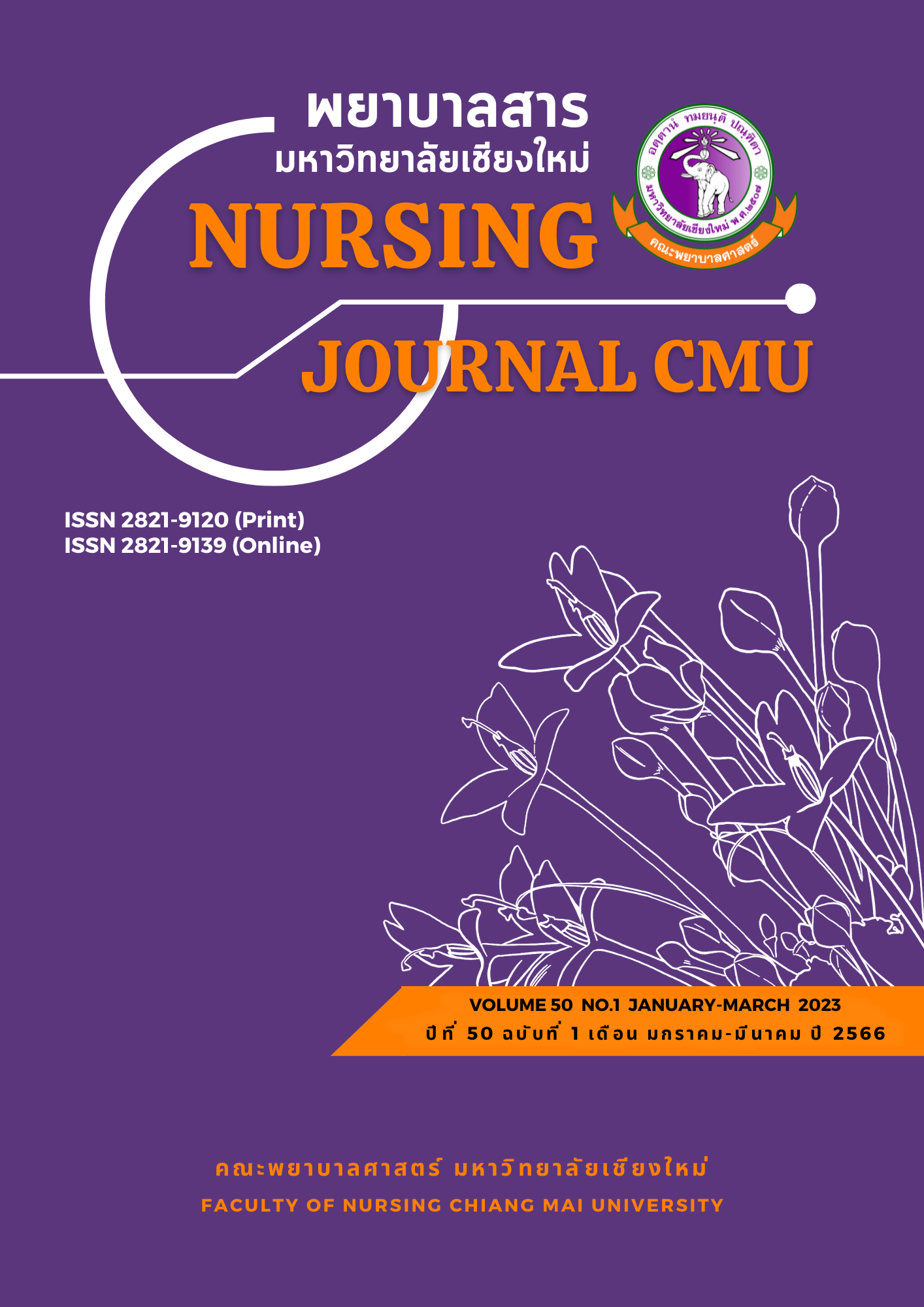The Effect of PITS-Based Education Health Literacy on Self-Management Among Older Persons with Chronic Kidney Disease Stage 1-3
Keywords:
PITS-based education, Health literacy, Self-management, Older persons with CKD stages 1-3Abstract
Appropriate self-management among older persons with chronic kidney disease (CKD) requires education to promote their health literacy. This experimental research aimed to study the effects of PITS-based education to enhance health literacy on the self-management of older persons with CKD stage 1-3. The sample consisted of older persons with CKD stages 1-3 receiving services at sub-district health promoting hospitals in Muang district, Lampang province. Fifty-four subjects were randomly selected, and 27 subjects were equally assigned into either the control or the experimental group. The experimental group was given group education 4 times, twice a week and one session for individual education, resulting in a total education period of 5 times over 3 weeks. The control group was given routine care. The research instruments included a PITS-based teaching plan, the health literacy manual for CKD stage 1-3 patients, a CKD stage 1-3 video, an understanding personal perception scale, and a health literacy for CKD questionnaire. Data collection tools consisted of a personal and illness data recording form and the self-management behavior for older persons with CKD questionnaire. Data were analyzed using descriptive statistics, independent t-test, and dependent t-test.
The results revealed that the mean score for self-management of older persons with CKD stages 1-3 receiving PITS-based education was higher than the score for those receiving routine care (t = -15.047, p < .001), and higher than before the intervention, at a significant level (t = 19.134, p < .001).
The findings indicate that PITS-based education can enhance health literacy and self-management among older persons with CKD stages 1-3. Hence, healthcare personnel can apply PITS-based education as a guideline for enhancing self-management among older persons with CKD stages 1-3.
References
American Kidney Fund. (2021). Stages of chronic kidney disease. Retrieved from https://www.kidneyfund.org/kidney-disease/chronic-kidney-disease-ckd/stages-of-chronic-kidney-disease/
Ardkhitkarn, S., Pothiban, L., & Lasuka, D. (2013). Self-management behaviors and predicting factors in elders with end stage renal disease undergoing continuous ambulatory peritoneal dialysis. Nursing Journal, 40(Suppl.), 22-32. (in Thai)
Burns, N., & Grove, S. K. (2009). The practice of nursing research: Appraisal, synthesis and generation of evidence (6th ed.). St. Louis, MO: Elsevier.
Chen, Y., Chang, L., Liu, C., Ho, Y., Weng, S., & Tsai, T. (2018). The roles of social support and health literacy in self-management among patients with chronic kidney disease. Journal of Nursing Scholarship, 50(3), 265-275. doi: 10.1111/jnu.12377
Chiangmai Provincial Public Health Office. (2018). Health screening guide for the elderly with health promotion. Chiang Mai: Author. Retrieved from https://www.chaiangmaihealth.go.th/cmpho_web/main_section.php?info_id =4197
Chuang, L. M., Viviennee Wu, S. F., Lee, M. C., Lin, L. J., Liang, S. Y., Lai, P. C., & Kao, M. C. (2021). The effects of knowledge and self-management of patients with early-stage chronic kidney disease: Self-efficacy is a mediator. Japan Journal of Nursing Science, 18(2), e12388. doi: 10.1111/jjns.12388
Cooray, B. P. R., Morrissey, H., Waidyarathne, E. I., Ball, P. A., & Sumanathilake, M. (2018). The impact of individual health education on health literacy: Evaluation of the translated version (Sinhala) of health education impact questionnaire in type 2 diabetes. International Journal of Diabetes and Clinical Research, 5(2), 1-8.
Department of Health, Ministry of Public Health. (2014). The elderly assessment from according to potential group according to the ability to carry out daily activities (Barthel activities of daily living: ADL). Nonthaburi: Author. Retrieved from http://hpc9.anamai.moph.go.th/ewt_dl_link.php?nid=508
Kuesuk, C., Panuthai, S., & Tamdee, D. (2022). Correlation between health literacy and self-management among older persons with chronic kidney disease. Journal of Bamrasnaradura Infectious Diseases Institute, 16(2), 1-12. (in Thai)
Lorig, K. R., & Holman, H. R. (2003). Self-management education: History, definition, outcomes, and mechanisms. Self-Management Education, 26(1), 1-7. doi: 10.1207/S15324796ABM2601_01
Moktan, S., Leelacharas, S., & Prapaipanich, W. (2019). Knowledge, self-efficacy, self-management behavior of the patients with predialysis chronic kidney disease. Ramathibodi Medical Journal, 42(2), 38-48. doi: 10.33165/rmj.2019.42.2.119901 (in Thai)
Nutbeam, D. (2000). Health literacy as a public health goal: A challenge for contemporary health education and communication strategies into the 21st century. Health Promotion International, 15(3), 259-267. doi: 10.1093/heapro/15.3.259
Nutbeam, D. (2015). Defining, measuring and improving health literacy. Health Evaluation and Promotion, 42(4), 450-456. doi: 10.7143/jhep.42_450
Shah, J. M., Ramsbotham, J., Seib, C., Muir, R., & Bonner, A. (2021). A scoping review of the role of health literacy in chronic kidney disease self-management. Journal of Renal Care, 47, 221-233. doi: 10.1111/jorc.12364
Stewart, M. N. (2020). The art and science of patient education for health literacy. New York: McGraw-Hill Medical.
The Nephrology Society of Thailand. (2014). Chronic kidney disease. Retrieved from https://www.hiso.or.th (in Thai)
The Nephrology Society of Thailand. (2017). Recommendations for holistic palliative chronickidney disease care. Bangkok: Text and journal. (in Thai)
Vargas, P. A. L., Tong, A., Howeel, M., & Craig, J. C. (2016). Educational intervention for patients with CKD: A systematic review. American Journal of Kidney Diseases, 68(3), 353-370. doi: 10.1053/j.ajkd.2016.01.022
Downloads
Published
How to Cite
Issue
Section
License
Copyright (c) 2023 Nursing Journal

This work is licensed under a Creative Commons Attribution-NonCommercial-NoDerivatives 4.0 International License.
บทความที่ได้รับการตีพิมพ์เป็นลิขสิทธิ์ของวารสารพยาบาลสาร
ข้อความที่ปรากฏในบทความแต่ละเรื่องในวารสารวิชาการเล่มนี้เป็นความคิดเห็นส่วนตัวของผู้เขียนแต่ละท่านไม่เกี่ยวข้องกับมหาวิทยาลัยเชียงใหม่ และคณาจารย์ท่านอื่นๆในมหาวิทยาลัยฯ แต่อย่างใด ความรับผิดชอบองค์ประกอบทั้งหมดของบทความแต่ละเรื่องเป็นของผู้เขียนแต่ละท่าน หากมีความผิดพลาดใด ๆ ผู้เขียนแต่ละท่านจะรับผิดชอบบทความของตนเองแต่ผู้เดียว






